|
|
|
Sort Order |
|
|
|
Items / Page
|
|
|
|
|
|
|
| Srl | Item |
| 1 |
ID:
191734
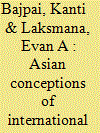

|
|
|
|
|
| Summary/Abstract |
How do major Asian states regard the current international security order? Do they agree or disagree among themselves? This is an introduction to a special section on ‘Asian conceptions of international order: what Asia wants’. It draws on articles analysing the stances of China, India, Japan, South Korea, Indonesia, Malaysia, Singapore, Thailand, Philippines and Vietnam towards the existing international security order usually described as a liberal international order (LIO). It argues that Asian states substantially support the main constitutive and regulatory norms and institutions of the LIO, but they worry that the LIO does not consistently honour these norms. Asians disagree on the centrality of political liberalism, but even Japan and South Korea, the most liberal states, are uncomfortable with strident criticism, punishment and the exclusion of less liberal states. Asians also disagree on the role of US alliances: some are strongly supportive, some are ambivalent and some are negative. Finally, Asians disagree on how they voice dissatisfaction. Japan and South Korea supplement existing norms and institutions as a way of transcending the limitations of the LIO; south-east Asian states promote ASEAN's mediatory role for peace and security above and beyond existing global arrangements; and Indonesia, India and China want to move from being norm takers to becoming norm shapers. The introduction ends with six policy implications.
|
|
|
|
|
|
|
|
|
|
|
|
|
|
|
|
| 2 |
ID:
191752


|
|
|
|
|
| Summary/Abstract |
The oceans have received extraordinary international attention in global policy and research. New insecurities and uncertainties, ranging from intensifying interstate disputes to persistent piracy and overfishing as well as to pollution, deoxygenation and climate change imply that the oceans are increasingly seen as being in crisis. This revolution in thinking about and addressing the oceans is driven by new ideas of why the oceans need political attention and care. In this article we demonstrate how four key new ‘blue paradigms’—maritime security, blue economy, ocean health and blue justice—have evolved and turned the oceans into a new area of priority. Each of these paradigms drives global ocean politics in different directions, which implies risks of fragmentation and conflicts. We work out the key differences between paradigms, investigating their underlying problematization, priorities and communities of practices involved. This provides a new map for navigating the complexity of global ocean politics useful for policy-makers and scholars. Thinking through paradigms also establishes a new analytical framework that allows for identifying conflicting priorities, tensions between ocean communities of practice, and ideas of how these can be managed. We conclude with a call for creative thinking of how synergies between the blue paradigms can be achieved in strategy, planning and research.
|
|
|
|
|
|
|
|
|
|
|
|
|
|
|
|
| 3 |
ID:
191735
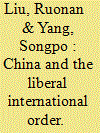

|
|
|
|
|
| Summary/Abstract |
How can we make sense of China's perceptions of and relationship with the liberal international order (LIO)? The majority of notable works on this topic have been written by foreign scholars who emphasize China's discontent with, or challenges it poses to, the LIO, while Chinese scholars have either focused solely on academic debates or attempted to interpret official foreign policies. This article aims to provide a balanced analysis of China's view of order by examining theoretical thought and policy practices from a Chinese perspective, drawing insights from both Chinese academic writings and government statements. We argue that there exists a perceptual difference between China and the West in understanding the postwar international order, with China emphasizing the functional part of the order and the West regarding it as based on its preferred ideological values. This perceptual difference has caused international suspicion about China's potential intentions to overthrow the LIO. In practice, China's approach has remained pragmatic, interacting dynamically with different subcomponents of the LIO. Although China's recent interactions with the LIO appear more ambitious, internal and external constraints, insufficient capacity, and lack of universally appealing values are preventing the birth of a Chinese version of international order.
|
|
|
|
|
|
|
|
|
|
|
|
|
|
|
|
| 4 |
ID:
191754
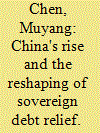

|
|
|
|
|
| Summary/Abstract |
China has become the world's largest bilateral creditor to low- and middle-income countries, and yet its participation in collective debt-relief frameworks led by western multilateral institutions—the International Monetary Fund, the World Bank and the Paris Club—has not met those institutions' expectations. Prevailing discussion perceives China's ‘reserved’ participation as free-riding on or contesting the international sovereign debt regime. This article advances ongoing discussion by drawing a historical parallel between China's current debt-relief approach and that of the United States and the multilateral institutions during and after the debt crisis of the 1980s. The article finds that towards the end of the 1980s, the US transitioned from practicing a new money approach—continued financing for existing projects—to a haircut approach—increasingly writing off debts. Around the same time, multilateral institutions started to become more acceptive of debt forgiveness. Yet China's policy banks, the main financiers of its overseas projects, have been primarily practising a commercially oriented, new money approach. China's rise has therefore revitalized an approach that western private banks once commonly practised and weakened the current international sovereign debt regime that took shape in the post-1980s decades.
|
|
|
|
|
|
|
|
|
|
|
|
|
|
|
|
| 5 |
ID:
191748


|
|
|
|
|
| Summary/Abstract |
The security implications of climate change are increasingly acknowledged in academic scholarship and in national security strategy documents. Climate change has also increasingly featured in UN Security Council (UNSC) debates since the first discussion of this topic in 2007. However, the UNSC has yet to agree a resolution formally recognizing its own role in addressing the implications of climate change for international security; a draft resolution on this issue was voted down in late 2021. Examining the statements and contours of 2021 debates preceding this vote, this article points to fundamental impediments to such a resolution, with the position of opponents (Russia, China and India) suggesting intractable obstacles linked to different visions of world order. While opponents' stated concerns about the UNSC's role in addressing climate change find some support in existing scholarship, the authenticity of claims made by opponents is called into question by the internal inconsistency of these arguments, the gap between stated concerns and foreign policy in other contexts, and the broader foreign policy interests and identities of these states. These factors present key impediments not simply to a UNSC resolution, but arguably to international action consistent with the urgency of the climate crisis.
|
|
|
|
|
|
|
|
|
|
|
|
|
|
|
|
| 6 |
ID:
191737


|
|
|
|
|
| Summary/Abstract |
This article examines Japan's security and foreign policy as an example of how a major power engages in the liberal international order (LIO) and what this implies for the future of that order. Facing China's increased power and influence in the past two decades, Japan has made strategic adjustments in response to regional and global power transitions while developing an idea of a wider geopolitical landscape on Prime Minister Shinzo Abe's initiative. However, this article argues that Japan's idea of an expanded regional scope and its vision of order were addressed decades earlier through ‘comprehensive security’ (sogo anzen hosho). While the country is an ally of the United States and clearly accepts the alliance as a key part of international order, Japan has its own ideas about international order; these accept much of the LIO but go beyond it, particularly in the articulation and operationalization of comprehensive security. By adopting the concept of norm localization, this article argues that Japan does not have the power to coerce others to take any actions to defend the current international order, but it can adapt and tweak the dominant LIO norms, principles and practices to build congruence with local norms of sovereignty and territorial integrity embedded in its own region. To create a broader consensus in favour of sustaining the LIO, major powers like Japan can approach the sceptics by presenting an alternative to either total rejection or total acceptance of the LIO norms.
|
|
|
|
|
|
|
|
|
|
|
|
|
|
|
|
| 7 |
ID:
191747


|
|
|
|
|
| Summary/Abstract |
Leadership by powerful states is considered crucial to the success of regional integration. Since the European Union (EU) entered a ‘polycrisis’, many eyes have therefore been on Germany. But does the German political elite see itself as a leader in Europe? To date, whether German political elite members have cast off their much-cited ‘leadership avoidance reflex’ has not been empirically investigated. Based on an original elite survey, this article therefore investigates the extent to which Germany conceives of itself as a leading power in the EU. The findings show that the time of a ‘leadership avoidance reflex’ is gone. Instead, there is a high level of agreement across EU policies that Germany should take on a leadership role. However, the study also exposes a gap between leadership aspirations and perceived reality, especially when it comes to Germany providing a vision for the future of Europe. In contrast to previous research, the article therefore argues that it is not the lack of desire for leadership, but the inability to realize such a role that keeps Germany from taking the lead in Europe.
|
|
|
|
|
|
|
|
|
|
|
|
|
|
|
|
| 8 |
ID:
191740


|
|
|
|
|
| Summary/Abstract |
Why do weaker states perceive the liberal international order (LIO) with ambivalence? This article argues that in the case of small states like Malaysia, historical memories, structural realities and domestic imperatives combine to explain their conceptions of and responses to the LIO. The article traces the features and unpacks the factors underpinning the paradoxes of small-state pragmatism vis-à-vis international order: a) rejecting power hierarchy but recognizing (and leveraging) power asymmetry; b) acknowledging its smallness but actively punching above its weight whenever possible; and c) promoting co-existence through principled contradictions. Such paradoxical pragmatism is quintessentially an act of hedging aimed at mitigating and off-setting multiple risks amid increasing uncertainties. This article makes three contributions. First, it contributes to the literature on international order by presenting a small-state perspective on the LIO, highlighting that small-state responses are more about ‘struggle for survival’, rather than ‘struggle for power’. Second, the notion of ‘paradoxical pragmatism’ engages the ongoing debate on ‘hedging’ in international relations. Third, the article's findings suggest that, theoretically, hedging and its dualistic elements are attributable to both structural and domestic-level factors. While structural conditions drive states to hedge, domestic factors determine the extent and manner in which states hedge.
|
|
|
|
|
|
|
|
|
|
|
|
|
|
|
|
| 9 |
ID:
191745


|
|
|
|
|
| Summary/Abstract |
In 2021, Aotearoa New Zealand's Foreign Minister, Nanaia Mahuta, sketched out a kaupapa Māori (collective Māori vision) foreign policy for New Zealand based on four tikanga Māori (Māori customary practices and behaviours): manaakitanga (hospitality), whanaungatanga (connectedness), mahi tahi and kotahitanga (unity through collaboration), and kaitiakitanga (guardianship and the protection of intergenerational wellbeing). This article makes a novel contribution to the global International Relations body of literature by questioning to what extent New Zealand's ‘Māori foreign policy’ has been applied to its relationship with China. Through assessing the communications of Mahuta and other officials, it is found that New Zealand is utilizing a kaupapa Māori framework towards China: ‘the taniwha and the dragon’. It is argued that New Zealand is attempting to consolidate the maturity of the Sino-New Zealand relationship, as well as differentiate itself from the other Anglosphere countries that have recently pushed back on China. In doing so, not only is New Zealand something of an outlier, it is demonstrating how eschewing a western-centric understanding of foreign policy for a more relational view based on indigenous knowledge and perspectives (in this case, from te ao Māori: the Māori worldview) can be applied at a time of increasing great power competition.
|
|
|
|
|
|
|
|
|
|
|
|
|
|
|
|
| 10 |
ID:
191751


|
|
|
|
|
| Summary/Abstract |
Why do victim states not ask for redress from perpetrator states? Focusing on former extractive colonies, the vast majority of which, despite having suffered brutal colonial rule, have not asked for redress—apologies, reparations or restitution—from their former colonizers, this article argues that the content of historical narratives in the victim state matters for interstate redress. When meta and sub-narratives in victim states do not conform with each other, framing and consensus mobilization on interstate redress is stymied. To show this, I code interstate redress in the Correlates of War data set of colony/colonizer states, and then use primary sources—interviews and school textbooks—to examine two victim states: Namibia, a ‘less likely’ case which has sought interstate redress, and India, a ‘more likely’ case which has not. Academic and policy conversations on interstate redress have thus far largely focused on perpetrator states. This not only denies victim states, most of which are developing countries, agency but skews our understanding of the phenomenon of seeking justice across international borders.
|
|
|
|
|
|
|
|
|
|
|
|
|
|
|
|
| 11 |
ID:
191743


|
|
|
|
|
| Summary/Abstract |
How do small powers choose the version of an international order to subscribe to? What factors are at play when a state subscribes to the rules-based order or decides to abandon those commitments and shift to an alternative version of order? The argument put forth in this article is that this choice is a function of domestic dynamics and the expected foreign policy gains of the sitting leader. In questioning the automaticity of a small power's choice, the article makes two important contributions. At the conceptual level, it supports the idea that orders persist because of the mutually constitutive actions of great and small powers. It lends credence to the claim of intersubjectivity in international relations and emphasizes that agency is anchored in relations between states. At the policy level, the article finds that while the Philippines seems to automatically subscribe to the United States-led order, pockets of resistance are a function of a colonial past that lingers to this day, which became fertile ground for the country's pivot to China during the Duterte administration. The article closes by highlighting that alliances risk their cohesion and effectiveness without coordinated maintenance, so policy lessons on alliance management are necessary to improve collective security arrangements.
|
|
|
|
|
|
|
|
|
|
|
|
|
|
|
|
| 12 |
ID:
191753


|
|
|
|
|
| Summary/Abstract |
The term ‘world order’ is perhaps the most enticing, consequential and vague concept in the diplomatic lexicon. There are countless scholars, analysts and policy-makers wrestling over its theoretical and practical dimensions. But often taken for granted in these examinations is the philosophical aspect—in other words, those fundamental reflections on the very purpose and nature of order across regional and international systems. Using a historical precedent as an example of this mode of thinking, this article makes the case for why questions related to political philosophy and political theory are essential to abstract and practical considerations of future world order.
|
|
|
|
|
|
|
|
|
|
|
|
|
|
|
|
| 13 |
ID:
191750


|
|
|
|
|
| Summary/Abstract |
The COVID–19 pandemic led to debates within International Relations (IR) as to the extent to which it would cause a rupture in the so-called liberal international order (LIO). This article is concerned with why such a rupture did not occur and draws on theories of racial capitalism to answer this question. It explores the political economy of three dynamics of the global response to the pandemic—lockdowns, border controls and vaccine distribution—and argues that rather than causing a rupture, COVID–19 has reinscribed various domestic and global racial hierarchies. The global divisions of labour and hierarchies of expendability that manifested in the unequal burdens of COVID–19; the border policies that both included and excluded based on racialized notions of who carries disease and the necessity of keeping capital in circulation; and the intellectual property regime and profit motives of pharmaceutical companies that led to inequitable vaccine distribution, are all intimately linked with key ideational and material institutions of the LIO. By drawing theories of racial capitalism into the IR literature on global health, the article points to the need for domestic and global health policy to address the deep-rooted racial inequities that characterized the COVID–19 pandemic ahead of future disease outbreaks.
|
|
|
|
|
|
|
|
|
|
|
|
|
|
|
|
| 14 |
ID:
191739


|
|
|
|
|
| Summary/Abstract |
Middle powers have been increasingly influential in world politics. Nevertheless, the study of international order pays little attention to their conceptions of order, and how they articulate these conceptions in world politics. This article focuses on Indonesia's conceptions of international order as an example of an emerging Asian middle power. It addresses two key questions: what is Indonesia's understanding of international order, and how has Indonesia engaged with liberal international order in the past twenty years? I argue that the foundation of Indonesia's conception of international order is premised on a desire to pursue autonomy in international politics. This vision was articulated by Vice President Mohammad Hatta and it has been maintained by different administrations. After its democratic reform in 1998, Indonesia began to articulate democracy as its preferred conception of international order. This was primarily demonstrated by two Indonesian presidents, Susilo Bambang Yudhoyono (2004–2014) and Joko Widodo (2014–present). On the one hand, Yudhoyono sought to ‘perform’ Indonesia's identity in the liberal international order as a home-grown democracy. Widodo, on the other hand, has been highlighting how material impacts of the liberal international order can deliver equitable development. By articulating democracy, both presidents have been able to constructively engage with the liberal international order.
|
|
|
|
|
|
|
|
|
|
|
|
|
|
|
|
| 15 |
ID:
191749
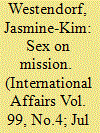

|
|
|
|
|
| Summary/Abstract |
This article critically reflects on twenty years of efforts to prevent and punish sexual exploitation by peacekeepers and humanitarian actors through the UN's zero-tolerance policy (‘the Bulletin’). I trace the assumptions and motivations that underpin the Bulletin's framing of (un)acceptable sex and investigate the operational and normative implications of its strong discouragement of sexual relationships with beneficiaries. I argue that, by construing the power differential between local communities and UN/NGO personnel as inherent, singular and totalizing, the Bulletin first reinforces conservative gender norms by framing women as perpetually and uniquely vulnerable and reinscribing gendered power imbalances. Second, it denies women agency in an era of Women, Peace and Security, laying the foundation for a detrimental separation between local people and international personnel. Third, it restructures paternalism in ways that entrench power imbalances between local communities and the organizations mandated to ‘protect’ them, reproducing colonial patterns of dealing with sex and sexuality. This analysis lays bare the tensions between care and control in how the international community responds to sexual misconduct by UN/NGO personnel and demonstrates the ramifications of these tensions for the practice and effectiveness of peace and humanitarian operations.
|
|
|
|
|
|
|
|
|
|
|
|
|
|
|
|
| 16 |
ID:
191741
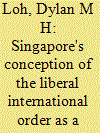

|
|
|
|
|
| Summary/Abstract |
The liberal international order (LIO) is undergoing significant challenges, and this has given rise to debates about its purported decline. In this context, most studies of the LIO focus on major powers with little attention paid to small states’ conceptualizations of the LIO despite its ubiquity in international life. Focusing on the Singaporean case as a small state, it asks the question: how does Singapore conceptualize the LIO and what are the effects of this conceptualization? Through a mixed-method thematic analysis of 192 parliamentary replies, media interviews and United Nations speeches by Singaporean officials between 2000 to 2022, I find Singapore accepting and defending the existing international order in two main ways: demonstrating respect for international law and the UN Charter, and supporting economic liberalism. Meanwhile, Singapore is contesting the universality of liberal democracy as it sees such discourse as a rebuke to its single-party dominant governance model. This perception of the LIO, in turn, informs Singapore's order-maintaining, order-modifying and order-contesting practices: it seeks to not only protect, but also to modify the LIO—through institutional and legal initiatives—to make it more equitable and open, giving us a glimpse into an instance of a small state's agency in relation to the LIO.
|
|
|
|
|
|
|
|
|
|
|
|
|
|
|
|
| 17 |
ID:
191738


|
|
|
|
|
| Summary/Abstract |
Despite South Korea's general support of the liberal international order (LIO), its actions often deviate from or weaken the practices and values of the LIO. Applying role theory, the article argues that this apparent contradiction in South Korea's foreign policy arises from a situation of role conflict due to its multiple and conflicting role conceptions. Following an analysis of leaders’ speeches and official policy statements, the article contends that it is the interpretation of the past, not just the past per se, that matters for role conception and contestation. For South Korea, the experience and differing interpretations of the Korean War have simultaneously produced both LIO-supporting role conceptions (‘responsible international citizen’, ‘middle power’ and ‘global pivotal state’) and LIO-deviating or weakening roles (‘US ally’, ‘balancer’ and ‘independent nation’), thereby causing role conflict and inconsistency in the country's foreign policy behavior. The latter roles push Seoul either toward a more realist, alliance-based form of order or causes it to focus more exclusively on the Korean peninsula order, which emphasizes independence and inter-Korean unity. Based on these insights, the article suggests that it is imperative to minimize domestic dissensus on the interpretation of critical historical events, in order to avoid potential role conflict and to promote consistency in foreign policy.
|
|
|
|
|
|
|
|
|
|
|
|
|
|
|
|
| 18 |
ID:
191746
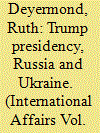

|
|
|
|
|
| Summary/Abstract |
This article examines the Trump administration's policy on Russian aggression in Ukraine and the problem of incoherence in Trump's foreign policy. It argues that the Trump administration's policy on Russia–Ukraine was characterized by incoherence, an absence of clear relationships between the views of senior administration members and official policy, and an unprecedented lack of transparency. Its policy on Russian aggression in Ukraine highlights the unconventional behaviour of the Trump administration as a foreign policy-making body, something which limits the ability of the foreign policy analysis (FPA) field to explain Trump policy. It argues that assumptions about foreign policy and the methods for researching it need to be rethought when administration practices fall so far outside US foreign policy-making norms, particularly in an era when changes in United States domestic politics mean that the Trump administration may not remain a unique case.
|
|
|
|
|
|
|
|
|
|
|
|
|
|
|
|
| 19 |
ID:
191742


|
|
|
|
|
| Summary/Abstract |
Based on statements made by political and military elites and government officials, the article explores how Thailand selectively supports and capitalizes on certain elements of the contemporary world order, namely United States-led security cooperation and economic liberalism, while half-heartedly embracing the ideals of liberal democracy. Although this never caused problems with the West during the Cold War, matters began to change in the 1990s against the backdrop of systemic-level shifts. While these developments have caused sporadic tensions with the West and effectively brought Thailand closer to China, Thailand has pragmatically sought ways to maintain its autonomy from both the United States and China. Based on Thailand's experience, this article reveals how smaller states pursue a variety of strategies to enhance their agency despite their lack of material capabilities. In turn, the discussion exemplifies how smaller states are not always determined by systemic level factors but possess the ability to prioritize and actualize regime security and national ideals while navigating the evolving international and regional orders.
|
|
|
|
|
|
|
|
|
|
|
|
|
|
|
|
| 20 |
ID:
191744
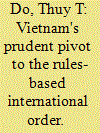

|
|
|
|
|
| Summary/Abstract |
Vietnam's conceptualization of the international and regional orders has changed remarkably over the past decades. Previously an outsider if not a challenger of the western-crafted liberal order, Vietnam has in recent years increasingly leaned toward a rules-based international order. This article argues that the reason for Vietnam's changing perceptions about the liberal international order is largely threefold: domestic reform and modernization; deepened integration into the international political economy; as well as growing strategic concerns over great power coercion stemming from China's rise. Vietnam's pivot to the rules-based international order, however, is cautious given Hanoi's lingering worry over western intentions to undermine Vietnam's socialist orientation, the path dependence of Vietnam's relationships with its traditional partners as well as the occasional clashes between the old, conservative worldview and the new, open-minded thinking in shaping its foreign policy. As a result, Vietnam's vision for a rules-based international order emphasizes universally negotiated rules and institutions, rather than western-dominated ones, with a focus on the rules and norms promoted by the United Nations and ASEAN. Amid the current power shift, Vietnam supports an emerging multi-polar and multi-center order in which small and medium states like itself would have a bigger voice and greater agency.
|
|
|
|
|
|
|
|
|
|
|
|
|
|
|
|
|
|
|
|
|